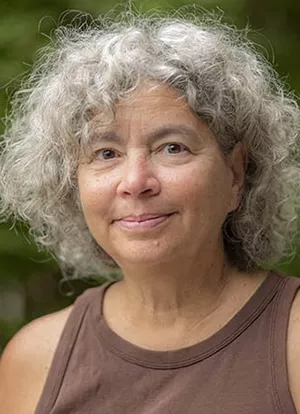Linguist Donna Jo Napoli Receives National Recognition for Lifetime's Work

Professor of Linguistics Donna Jo Napoli has been named to the prestigious ranks of American Association for the Advancement of Science (AAAS) Fellows.
“A linguist down to [her] toes” and a steadfast advocate for the deaf, Napoli joins a venerable cadre of scientists, engineers, and innovators whom AAAS recognized for their achievements across an array of disciplines. She was chosen to their 2024 class of fellows for “distinguished contributions to the scientific understanding of signed languages and for enhancing the inclusion of deaf researchers and sign-language communities in science.”
It’s quite the honor for Napoli — a full-circle moment for someone who grew up not expecting to even attend college.
“It might just be one more accolade to others in their careers, but to me it is stunning,” she says. “And I know it's because I've been lucky enough to have so much help from so many wonderful people.”
The fellowship from the AAAS, one of the world’s largest general scientific societies and publisher of the Science family of journals, is considered a distinguished lifetime honor within the scientific community. The 2024 class consists of 471 scientists, engineers, and innovators across 24 AAAS disciplinary sections, including the linguistics section to which Napoli belongs.
“This year’s class of fellows are the embodiment of scientific excellence and service to our communities,” says Sudip S. Parikh, Ph.D., AAAS chief executive officer and the executive publisher of the Science family of journals. “At a time when the future of scientific enterprise in the U.S. and around the world is uncertain, their work demonstrates the value of sustained investment in science and engineering.”
The 2024 class joins the ranks of noted fellows such as Alondra Nelson, the Harold F. Linder Professor at the Institute for Advanced Study and former deputy assistant to President Joe Biden and acting director of the White House Office of Science and Technology Policy; Mae Jemison, the first Black woman to go to space; Steven Chu, 1997 Nobel laureate in physics who served as the 12th U.S. Secretary of Energy; and Grace Hopper, pioneer in computer software development and programming language.
Napoli is among at least three Swarthmore faculty members to receive AAAS Fellow honors, following Peter Collings, Morris L. Clothier Professor Emeritus of Physics, and Scott Gilbert, Howard A. Schneiderman '48 Professor Emeritus in Biology.
Looking back on her career, Napoli cites the constant and varied nature of her research. She works on phonetics, phonology, morphology, syntax, and semantics of sign languages, in both synchronic and diachronic studies. And she does significant comparative work between these and other languages: American Sign Language (ASL); Italian Sign Language (LIS); German Sign Language (DGS); British Sign Language (BSL); Libras, the sign language of Brazil; and Irish Sign Language.
The AAAS noted Napoli’s unwavering service to her field in awarding the fellowship.
“I work hard to serve the communities whose languages I study,” says Napoli, whose research tends to focus on linguistic modality differences.
Chief among her recent projects is co-directing the Reading Involves Shared Experiences (RISE) project with Gene Mirus of the Deaf Studies Department of Gallaudet University. The RISE videobooks bring fun stories in sign languages to deaf children around the world.
“It has become something of a model for aiding early literacy of deaf children,” says Napoli, who credits support from the Lang Center for Civic & Social Responsibility, in particular, as well as the Sager Foundation, the Center for Innovation and Leadership (CIL), the President’s Fund for Racial Justice, the Tri-Co Disability Fund, and more people and departments across the College in helping to build RISE.
Napoli also belongs to a team — the rest of whose members are deaf — who advocate for the language rights of deaf children. Their efforts center on publishing in medical journals, aiming to convince medical professionals to urge parents to raise their children with signing, whether or not they get a cochlear implant (CI). (View the team’s articles here).
“This work has given me the confidence to give presentations nationally and internationally on the raising and educating of deaf children,” says Napoli, who recently returned from giving a two-hour presentation at the Early Hearing Detection and Intervention (EHDI) conference.
Napoli relishes her collaborations with students at Swarthmore, some of whom “stumbled into class almost by accident,” she says, only to become deeply involved in sign languages. Napoli conducted two research studies with Casey Ferrara ’14, and she lauds Melissa Curran ’19 for spreading awareness of RISE during the COVID-19 pandemic and Mehtap Yercel ’24 and Jiho Shin ’25 for expanding the project in Turkey and Korea, respectively.
“And I simply wouldn’t know what to do without Joey Driscoll ’26 and Damian Rene ’27,” she says, citing both the tech savvy and awareness of the needs of deaf children they bring to the task of maintaining the RISE site.
Napoli is the current recipient of the Maurice Eldridge Faculty Fellowship, a 4-year appointment that supports a member of the faculty whose scholarship and teaching contributes significantly to community service and civic engagement, linking teaching and scholarship to real-world community-based engagement.
She has cherished opportunities to co-teach with Syd Carpenter, Peggy Chan Professor Emerita of Black Studies, professor emerita of art; Ellen Gerdes, visiting assistant professor of dance; Jon Kochavi, professor of music; Rosaria Munson, J. Archer and Helen C. Turner Professor of Classics; Elizabeth Stevens, associate professor and department chair, theater; and Olivia Sabee, associate professor of dance. Additionally, Napoli enjoyed collaborating with Shizhe Huang, professor of linguistics, Asian Studies, and Chinese at Haverford College.
“Working with someone who comes at the material in a very different way from how I come at it opens my eyes,” she says. “And that's what I need for my research — open eyes, open mind.”



